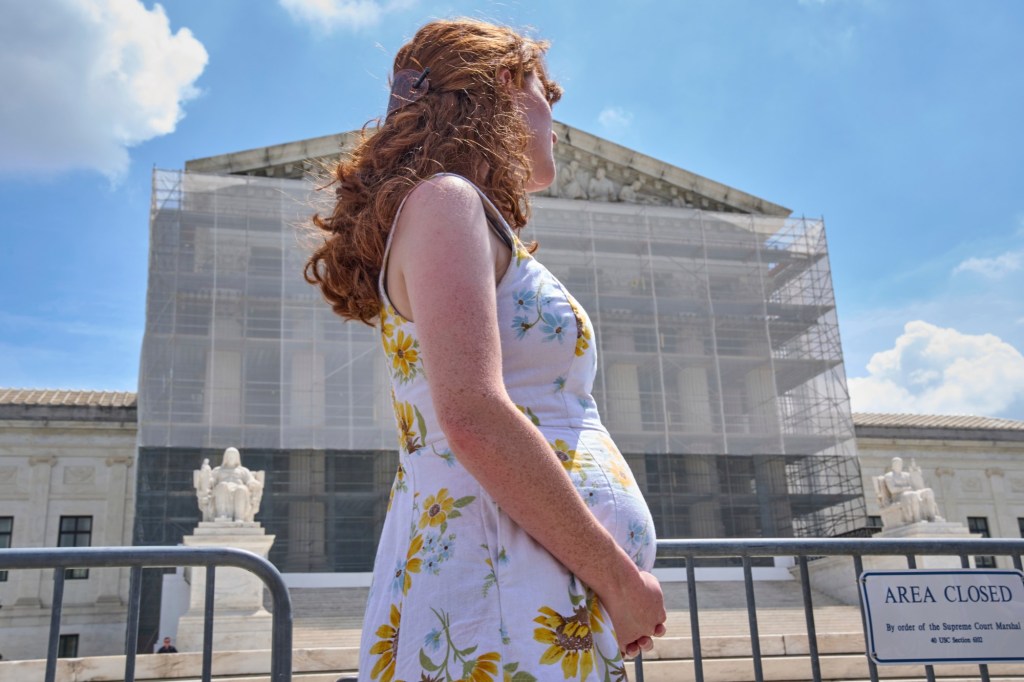
By HOLLY RAMER and MIKE CATALINI, Associated Press
CONCORD, N.H. (AP) — The legal fight over President Donald Trump’s order ending birthright citizenship is advancing on a path toward the U.S. Supreme Court.
A New Hampshire federal judge on Thursday issued a ruling prohibiting the president’s January executive order ending birthright citizenship for children born to those without legal status from taking effect anywhere in the U.S.
The judge’s preliminary injunction and certification of a class-action lawsuit blocks the order, though it included a seven-day stay to allow for appeal.
The district court judge’s decision comes less than a month after the Supreme Court limited lower courts from issuing nationwide injunctions without settling the underlying question of the constitutionality of the president’s order. The high court also left open the possibility that birthright citizenship challenges could remain blocked nationwide.
Here’s what to know about birthright citizenship and what happens next.
What birthright citizenship means
Birthright citizenship makes anyone born in the United States an American citizen, including children born to mothers in the country illegally.
The practice goes back to soon after the Civil War, when Congress ratified the Constitution’s 14th Amendment, in part to ensure that Black people, including former slaves, had citizenship.
“All persons born or naturalized in the United States and subject to the jurisdiction thereof, are citizens of the United States,” the amendment states.
Thirty years later, Wong Kim Ark, a man born in the U.S. to Chinese parents, was refused reentry into the U.S. after traveling overseas. His lawsuit led to the Supreme Court explicitly ruling that the amendment gives citizenship to anyone born in the U.S., no matter their parents’ legal status.
It has been seen since then as an intrinsic part of U.S. law, with only a handful of exceptions, such as for children born in the U.S. to foreign diplomats.
Trump has long said he wants to do away with birthright citizenship
Trump’s executive order, signed in January, seeks to deny citizenship to children who are born to people who are living in the U.S. illegally or temporarily. It is part of the hard-line immigration agenda of the president, who has called birthright citizenship a “magnet for illegal immigration.”
Trump and his supporters focus on one phrase in the amendment — “subject to the jurisdiction thereof” – saying it means the U.S. can deny citizenship to babies born to women in the country illegally.
A series of federal judges have said that is not true, and issued nationwide injunctions stopping his order from taking effect.
“I’ve been on the bench for over four decades. I can’t remember another case where the question presented was as clear as this one is. This is a blatantly unconstitutional order,” U.S. District Judge John Coughenour said at a hearing earlier this year in his Seattle courtroom.
The justices didn’t say if Trump’s order is constitutional
The high court’s ruling was a major victory for the Trump administration in that it limited an individual judge’s authority in granting nationwide injunctions based on individual plaintiffs.
The administration hailed the ruling as a monumental check on the powers of individual district court judges, whom Trump supporters have argued want to usurp the president’s authority with rulings blocking his priorities around immigration and other matters.
But the Supreme Court did not address the merits of Trump’s bid to enforce his birthright citizenship executive order, and it left the door open for class action lawsuits challenging it.
The Supreme Court said district judges generally can’t issue nationwide injunctions. But the court didn’t rule out whether judges could accomplish much the same thing by a different legal means, a class action.
Various legal pathways
New Hampshire District Court Judge Joseph Laplante’s decision comes amid legal challenges to the president’s order in district and appellate courts across the country.
Among the other cases pending are lawsuits brought by some two dozen states and cities, immigrant rights advocates and mothers and mothers-to-be.
A district court judge in Maryland is considering arguments over how to proceed since the Supreme Court’s opinion limiting nationwide injunctions.
New Jersey and other states’ attorneys general are arguing a nationwide pause of the order is warranted under the high court’s recent opinion and that it’s up to federal government to propose other remedies for the courts to consider.
Boston College law professor Daniel Kanstroom, an immigration law expert, said he thinks the case is bound for the Supreme Court.
“The stakes in this case could not possibly be higher,” he said. “It affects millions of people. It affects the whole nature of our immigration system. And it in many ways, it affects the continuing question of how we reacted to slavery and to the Civil War and what the 14th Amendment was about in the first place.”
Associated Press writers Tim Sullivan, Alanna Durkin Richer, Mark Sherman and Lindsay Whitehurst in Washington contributed to this report.



